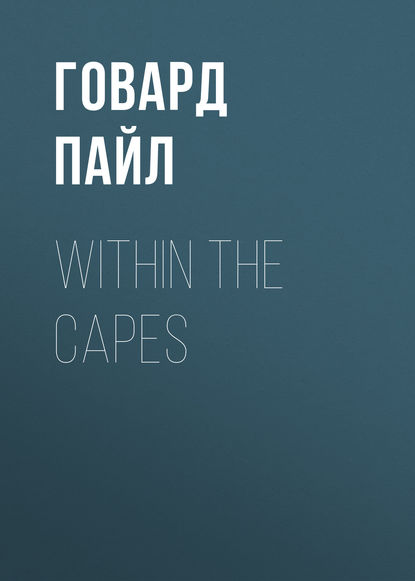По всем вопросам обращайтесь на: info@litportal.ru
(©) 2003-2024.
✖
Within the Capes
Настройки чтения
Размер шрифта
Высота строк
Поля
“Well, Jack,” said Tom, at last; “I suppose that we might as well be stirring.”
“I reckon we might,” said Jack, and then he stretched himself, as a first step toward getting up.
At that moment a sound fell upon their ears. It was not one to which you would have given a second thought, and yet if it had been a clap of thunder out of a clear sky, it could not have startled the two more than it did.
When they had rebuilt their hut after it had been destroyed by the great hurricane, they had not located in the same spot in which they had lived before. An eddy of the wind had scooped a hollow out of the side of the sand hill, and it was in the side of this cup-shaped hollow that they had digged their house, and had roofed it in with the cutter as they had done before; for they thought that they would be more sheltered in this spot if another hurricane should come upon them. Looking from this hollow in front of them, they could see nothing but a part of the western ocean and the upper end of the sand-spit, whereupon they worked from day to day. It was just back of them, and from the crest or brim of this sandy bowl that the sound came that startled them so greatly.
It was the sound of a man’s voice.
“Ahoy there!”
For a moment Jack and Tom looked at one another without turning around. This minute I can see just how Jack stared at Tom; his mouth agape, and his eyes as big as saucers. But it was only for a moment that they sat looking at one another so amazedly, for the next instant they jumped to their legs and turned around.
A burly red-faced man was standing on the crest of the white sand hill, his figure sharply marked against the blue sky behind him. His hands were thrust deeply into his breeches pockets, and he stood with his legs a little apart. He had a short cutty pipe betwixt his teeth; – the bowl was turned topsey-turvey, and there was no light in it. When he saw that Tom and Jack were looking at him, he spoke again, without taking the pipe from out his mouth.
“Are you fellows the first and second mates of the Nancy Hazlewood, privateersman?”
Jack nodded his head.
The man turned and beckoned two or three times, and then came slowly and carefully down the steep side of the sand dun, half sliding, half stumbling. The first thing that he said when he came to where they were, was:
“I just tell you what it is, mates; that mess of fish smells mighty good.” Then he asked which of them was the first mate.
“I’m the first mate,” said Jack.
By this time three or four heads rose above the crest of the hill, and a little knot of sailors gathered on the top of the dun; then they came jumping and sliding and stumbling down to where the others were standing.
But all this time Tom was like one in a dream. I think that he must have been dazed by the suddenness of the coming of that for which he had longed so bitterly and so deeply. He tried to realize that they were rescued; that these men were about to take them away; that they were really to leave the island that had been their prison for so many long and weary days, and that in a few weeks at the furthest, he would be in Eastcaster again, and would see Patty, and would be talking with her of all these things. Many a time in the silence of the lonely night, he had pictured their rescue to himself, and in the sleep that followed, he had perhaps dreamed that a boat was lying on the beach below their hut, and then had wakened to the bitterness of its being only a dream. But now that rescue had in truth come to them, he could no more realize it than you or I can realize that we are really to see the other world, some time to come. So he stood leaning against the poor old shattered cutter that had sheltered Jack and him for so long, and as he leaned there he looked about him, wondering dully, whether or not he would not awaken in a few minutes and find this too to be only a dream. He heard the man who had hailed them, telling Jack that he was the first mate of the barque Baltimore, of Baltimore, and that they were bound for New York from Key West, having run fifty miles out of their course to pick them up at this island. He heard him ask Jack which one of them had set the bladder of porpoise hide adrift, that the Baltimore had picked up off the Florida coast, and saw that Jack jerked his thumb toward him, and that the mate of the Baltimore was looking at him, and was saying that it was a d – d clever Yankee trick. He saw the sailors crowding around, looking here and there; peeping and prying into the doorway of the hut, and talking amongst themselves. “Blast my eyes, Tommy, look at this here shanty!” “Well, I’m cussed if they hain’t got a ship’s boat slung up for a roof!” “Damme! look at his beard and hair; (this in a hoarse whisper) he’s the second mate, Bill; – Granger, you know.”
Then he heard Jack ask the mate of the Baltimore for a chew of tobacco. He cut off the piece of the plug with his old broken jack-knife, and Tom watched him doing it as though it was a matter of the greatest moment to him. I can recollect that he thought dully how Jack must enjoy his tobacco after having been so long without it.
After a while there was a movement, and he heard Jack calling to him to come along, as they were all going over to the boat, but it was still in the same dazed state that he walked along the beach with the others until they came around the end of the sand hills, saw the bay open before him, and the barque floating like a swan upon the smooth surface of the water. A ship’s boat was lying high and dry on the sand of the beach, and two sailors were sitting in the stern, smoking comfortably and talking together. They tumbled out of the boat and stood looking as the others drew near, and Tom thought what a strange sight Jack and he must be – ragged, tattered, patched, half-naked, with beards reaching to their breasts, and heads uncovered, excepting for the mat of hair that hung as low as their shoulders. He had not thought of their looking strange before this.
So they reached the boat, and Tom stood for a moment looking down into it and at the oars lying along the thwarts within. Then he and Jack and Mr. Winterbury (the first mate) climbed in and the boat was shoved off, grating on the sand as it moved into the water. There was a rattle of oars dropped into the rowlocks, and then the regular “chug! chug!” of the rowing. He looked back and saw the island and the beach and the white sand hills that he knew so well dropping slowly astern. It seemed very strange to be looking at them from the ocean. At last they were close to where the barque was slowly rising and falling upon the heaving of the ground swell that came rolling in around the point of the sandy hook beyond. This is the way in which their rescue came.
As they swept under the lee of the barque Mr. Winterbury stood up in the stern sheets of the boat. There were a row of faces looking down at them from the forecastle, and two or three sailors were standing on the bulwarks, holding on to the shrouds. They, too, were looking down into the boat. Two men were standing near to the break of the poop. One of them was a handsome young fellow of about twenty; the other was a tall, rather loose-jointed man, somewhat round-shouldered, and a little past the prime of life. He had his hands clasped behind him, and he hailed the first mate as soon as the cutter came alongside.
“Did you find them all safe and sound, Mr. Winterbury?”
“Yes, sir; safe and sound.”
Mr. Winterbury went up the side first, and Jack and Tom followed close at his heels. They were met by Captain Williamson as soon as they had stepped upon the deck. He shook hands with them, and immediately asked them to step into the cabin, for he must have seen that it was trying to them to be stared at by all of the ship’s crew. There was a decanter of Madeira and three glasses on the cabin table. Captain Williamson bade Tom and Jack be seated, and then sat down himself. He filled one of the glasses, and then passed the decanter to the others, bidding them to fill likewise, which they did.
It may not be out of place here to give you a description of Captain Williamson. He was one of the skippers of the last century, the like of which we rarely, if ever, see nowadays. He was part owner in the craft that he sailed, and made a good thing of it. He came of an old Annapolis family, and was a courteous, kindly, Christian gentleman, though stiff and formal in his manners. He fancied that he looked like General Washington, and it was a weakness of his to act and carry himself as nearly as he could after the manner of the General, who, by the by, was a distant relative or connection, though by marriage, if I mistake not. Another weakness of his was a fancy that he would have made a great naval captain if he had only had the opportunity.
As it was, he had never smelt fighting powder in all his life; nor was he likely to do so, for, though no coward, he was cautious and careful in the extreme, and would never willingly have entered into action, even with a fighting bum-boat. He always wore a cocked hat, like an admiral, knee-breeches, buckles and pumps, and when he was standing still rested mainly on one foot, with his hands clasped behind him and the knee of the other leg bent, just as General Washington always stands in the pictures that one sees of him.
So he sat now, with one knee crossed over the other, very stiff and straight, just as General Washington might have sat if he had been sitting in the cabin.
“May I ask which of you is the first mate?” said he.
“I’m the first mate, sir,” said Jack.
“Mr. Baldwin, I believe?”
“Yes, sir.”
“Was it you, sir, who conceived the extremely ingenious and clever plan of sending bags or bladders of porpoise hide afloat, with your condition and location inclosed within them?”
“No, sir,” said Jack, “it was my mate here,” and he chucked his thumb toward Tom.
“It was a very clever thought – very clever indeed,” said Captain Williamson, turning to Tom. “How did you get that black substance with which it was covered?”
“We mixed the porpoise blubber with soot,” said Tom.
The captain nodded his head. “Very clever indeed,” said he again, “it was very efficacious, for the bladder was quite covered with the substance when we picked it up – so much so, indeed, that my fingers were thoroughly befouled in the handling of it. And was it you, also, who made the map of the island?”
“Yes, sir,” said Tom again.
Then Captain Williamson nodded his head once more, and said for the third time: “Very clever – very clever, indeed.” Then he told Tom that the Baltimore had picked up the bladder off the Florida coast. “It was,” said he, “but fifty miles out of my course to come to this island, for I am bound for New York harbor. I recognized the situation of the island from the plan of it found enclosed in the bladder.”
“It was a kind and Christian act on your part,” said Tom. “Very few captains would have run fifty miles out of their course to pick up two poor souls, ’specially while so many British cruisers are about. I and my mate – ”
Here he stopped, for a great lump rose in his throat until it seemed to choke him.
“Tut! tut! tut! tut!” said Captain Williamson, holding up his hand deprecatingly; “it was no more than one Christian man ought to do for another. Say no more of that, I beg of you. There are many questions that I wish to ask of you in reference to the loss of the Nancy Hazlewood, but I will not trouble you with questions just at this season. I will beg of you to give such an account, however, after you are refreshed with clean linen and clothes, and what not.”
As Captain Williamson paused for a moment Tom looked at Jack, and saw that he fidgeted restlessly in his chair when the other spoke of the Nancy Hazlewood. There was a great deal about her loss that would be very difficult and very bitter to tell.
“In the meantime,” said Captain Williamson, resuming his speech, “you need have no anxiety about anything that you may desire to fetch away from the island with you, for I have sent a boat ashore under my second mate, Mr. Bright. He will see that everything is brought safely away from your hut or cabin. So, as I said, you need have no anxiety on that score.”
At these words Jack and Tom sprung to their feet, for the thought struck them both at once that their money would be found, and that in an hour’s time every man aboard of the ship would not only know that the two castaways had been digging for treasure, but would also know where that treasure had been found. It would be no secret then, but would be known to all, and there was no telling what such knowledge might bring with it. It was a thing that no one but the captain or the chief officers of the ship should be aware of just at the present time.
“Captain Williamson,” cried Jack, “for the love of heaven, don’t let that boat go ashore just yet! Tom, you speak to him, you’re blessed with the gift of talk; speak to him, and tell him about the mon – , about you know what.”
“Yes, captain,” cried Tom, “for heaven’s sake don’t let the boat go ashore till we tell you something first.”
Captain Williamson had also risen to his feet. He seemed to be very much amazed at their words. “Why not? Why shouldn’t the boat go ashore?” said he. “What does all this mean?”
“Has the boat left the ship yet, captain?” said Tom.
“Yes; the boat has left the ship; but what does all this mean, I say?”
“Then, stop it – call it back!” cried Tom.
Jack was walking up and down, patting his clenched fist in his excitement. “I’ll tell you what it means,” he blurted out; “it means that there’s nigh to nine thousand dollars in silver money in that hut, and that the crew of the boat mustn’t find it there.”
“Nine thousand dollars!” repeated Captain Williamson; and then he stopped and stood glaring at the two men as though he doubted he had heard aright.












